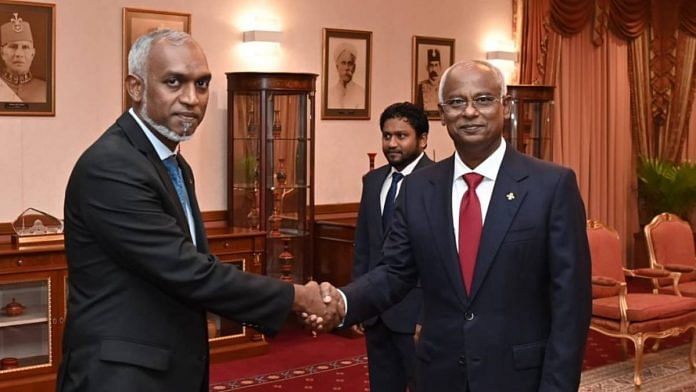Maldives’ President-elect Mohamed Muizzu made two decisions in the first 48 hours since he roundly defeated the outgoing pro-India president Ibrahim Solih on Sunday. First, he ordered the end of the incarceration of his coalition partner and former pro-China president Abdulla Yameen and had him moved from jail to house arrest in Malé.
Then he announced that all foreign military forces stationed in the Maldives would be sent back home.
Both had been on the cards, at least since early September, when Muizzu won the first round of the presidential election. While the first decision was aimed at pleasing Yameen, and probably softening him up so he can help with delivering some of the poll promises, the second was directly aimed at India.
Linchpin of Indo-Pacific strategy
Over the last year or so, India has moved fast to develop key security infrastructure in this paradise island nation that lies across the Equator. The Maldives is becoming a linchpin in the Indo-Pacific strategy that India and other Quad nations have been developing.
In 2022, India built a network of 10 radar stations around the Maldives on a grant of $15.8 million, which were integrated into the Indian coastal radar system. They are operated by the Maldives Coast Guard and connected to the Indian Coastal Command.
When India’s Minister of Defence Rajnath Singh visited the Maldives earlier this year, he inaugurated the construction of a naval facility on Uthuru Thila Falhu island. This was part of a defence agreement signed in 2021, for which India gave $50 million, also to develop a harbour and dock that New Delhi would manage for 30 years.
But a furor was raised by the Solih government’s decision to deploy 75 Indian military personnel to “operate and maintain” one Dornier aircraft and two helicopters, which would be managed by the Maldivian National Defence Forces (MNDF), with all costs covered by New Delhi. The two helicopters had been sent as early as 2013 during the Manmohan Singh government. The deployment of the Indian “technicians” to run the aircraft, as they were called, allowed Yameen to stoke his faithful from jail and mount an “India Out” campaign. Muizzu realised that he would have to follow the campaign if he wanted the support of pro-China Yameen.
So, one simple question, shorn of all diplomatic jargon and think-tank verbiage, that must be asked this week after the victory of Muizzu is: Has India lost, and has China won the Maldives?
Let’s not forget that Prime Minister Narendra Modi did the smart thing by congratulating Muizzu on his victory. When you are the PM of such a large country as India, it’s the only wise course of action. You have such huge stakes in your neighbour that you reach out to the enemy and offer to continue extending a helping hand.
It’s not that India has lost and China has won – that would be too simplistic a statement, written for and by journalists who like the black-and-white. The problem is that India was so confident of its alliance with Solih, and so determined to follow its own path that it shrugged off those who differed.
Certainly, hubris is a strange affliction. It creeps upon you suddenly, even as you are becoming a stronger, more eloquent, and more capable nation. Then suddenly, without warning, it injects itself into your bloodstream and begins to contaminate your decision-making process.
India was so sure of Solih and determined to decapitate Yameen’s pro-China agenda that it forgot to take the others along.
The truth is that Solih lost because he antagonised his old friend and mentor as well as the Maldives’ most charismatic politician, Mohamed Nasheed. When Nasheed split the mother party, the Maldivian Democratic Party, Solih and India should have known that his days were numbered.
India has lost the linchpin of its Indo-Pacific strategy because it was unable to let other people, besides Solih, take the credit for the development of the Maldives.
Also read: Victory for ‘India Out’? What ‘pro-China’ Muizzu’s win in Maldives means for island nation & Delhi
India-Maldives ties
No doubt, India will soon recover and make nice with Muizzu. The relationship between the two countries is far too significant, and India is far too big for either side to stray too far. Muizzu’s advisors are already saying that nothing much will change and that Muizzu will visit India on his first foreign trip as president.
To think that that’s what we must follow these days – is Muizzu visit India first or going to China? Will Nepal’s PM Prachanda is first going to China, like his predecessor KP Oli did, or India (he came to India a few months ago and has just returned from a visit to Beijing.) And what of Sri Lanka’s President Ranil Wickremesinghe? Why did it take him a full year to visit New Delhi?
And so it goes. Muizzu is the latest leader in the region who has asserted himself, with more than a little help from China—in this case, via Yameen. It is natural that the dragon will now flex its muscles. Perhaps the Maldivian-China free trade agreement that has been pending since Yameen’s presidency will now be signed; perhaps Chinese tourists will now flood Maldives’ pleasure islands where Bollywood divas in their bikinis roamed all through Covid.
Then there is the other charge of Muizzu being an Islamist radical—it’s not just his beard which gives him away, even though it frames a firm, but kind face. It’s the fact that his wife, Saajidhaa Mohamed, is sister to a leader who belongs to the Islamist right-wing Jamiat ul-Salaf organisation.
How will all of the above unfold in the coming years? How will the India-Maldives relationship survive the strain, the stress and the push-pull?
Jyoti Malhotra is a senior consulting editor at ThePrint. She tweets @jomalhotra. Views are personal.
(Edited by Ratan Priya)



